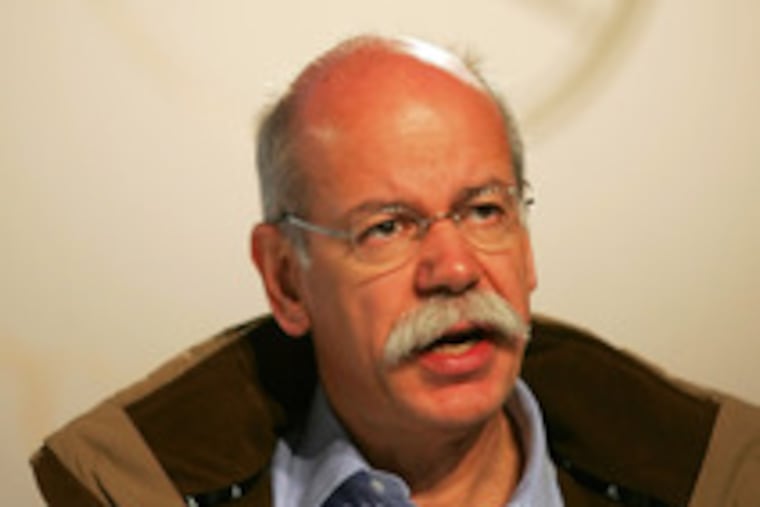Chrysler shifts back to U.S. control
FRANKFURT, Germany - The 1998 merger between Daimler-Benz and Chrysler Corp. was billed as a merger of equals and a marriage made in heaven - the perfect model for the future of auto manufacturing worldwide.

FRANKFURT, Germany - The 1998 merger between Daimler-Benz and Chrysler Corp. was billed as a merger of equals and a marriage made in heaven - the perfect model for the future of auto manufacturing worldwide.
After nine tumultuous years, it was neither - ending in divorce as the combined company, DaimlerChrysler AG, announced yesterday that it was selling most of the Chrysler business for $7.4 billion. The buyer is a New York private equity firm, Cerberus Capital Management L.P.
The $36 billion deal that saw Daimler-Benz AG take over Chrysler Corp. sputtered through nearly a decade of up-and-down Chrysler earnings and repeated cost-cutting. In the second half of last year, Chrysler posted losses - $1.6 billion in the third quarter and $168 million in the fourth quarter. Results for this year's first quarter are to be announced today.
Through it all, there was the simmering resentment of German shareholders, who felt that something pedestrian, unimpressive - indeed, American - had dulled the lustrous sheen of one of their country's greatest carmakers.
Now, the sale of Chrysler is a public illustration of the pitfalls inherent in attempting to bring carmakers from Asia, Europe and the United States into large-scale partnerships.
"Big cross-border mergers in the auto industry have never worked," said Stephen Cheetham, a European auto analyst at Sanford C. Bernstein Ltd. in London. "Megadeals in the auto space are very problematic."
In the Philadelphia area, Chrysler Group dealers saw the change in ownership as good news.
"We'll be an American company again," said Carl Weirick, general manager of Anthony D'Ambrosio Dodge-Chrysler-Jeep in Elverson, Chester County, in a wry observation minutes after he had read the e-mail informing him of the deal.
The planned sale should be good for dealers because it eliminates uncertainty about who will own the auto manufacturer and the direction it will take.
Weirick said the new ownership must focus on manufacturing the types of cars that people wanted to buy.
Don Bragg, general manager of Gegnas Chrysler Jeep in the Frankford section of Philadelphia, said he, too, thought "the product is good. Quality is good. We got caught because of energy. We didn't have any small cars."
But Chrysler's 80,000 workers may pay the price for DaimlerChrysler's decision to sell 80 percent of Chrysler Group to Cerberus. The German company will retain the rest of Chrysler, which will be renamed Chrysler Holdings LLC.
Talks begin soon between the United Auto Workers and Detroit's carmakers on a national contract, and analysts said yesterday that they expected Cerberus, headed by former Treasury Secretary John Snow, to push for radical changes in the money-losing Chrysler, Jeep and Dodge operations.
The announcement yesterday sent shudders through much of Chrysler's workforce, despite assurances from Chrysler chief executive Tom LaSorda that there were no major plans under discussion with Cerberus to cut jobs beyond a previously announced restructuring plan.
Chrysler has a plant in Newark, Del.
Cheetham, the analyst in London, said the creation of DaimlerChrysler was at the peak of transnational tie-ups in the late 1990s, such as General Motors Corp. linking with Korea's Daewoo Motor. But, he said, "globalization in the auto business these days is not very pragmatic."
The drawbacks include the higher costs of shipping and transportation, rising health-care and pension-funding costs in the United States, and cultural differences.
"The Germans never knew really quite what to do with Chrysler," Cheetham said. "Managing across the pond and managing this very, very different business is very difficult."
It all looked different in the mid-1990s. Daimler-Benz was eagerly searching for new markets and new opportunities, at the dawn of what many thought would be an age of global consolidation. Chrysler was an ideal target, with a line of cleverly designed, efficiently built minivans, pickups and Jeeps.
Throw in a rich country that was car crazy and it made perfect sense.
The company rebounded from a brutal 2001 restructuring and launched hits such as the 300C, only to see earnings slip again. After declining sales and recalls over defects, DaimlerChrysler dumped its other cross-border venture, with Mitsubishi in Asia, in 2004.
And as gas prices rose, consumers looked to smaller cars with better mileage. Ferocious competition with rivals General Motors and Ford Motor Co., along with Japan's Toyota Motor Co. - unencumbered by the crippling legacy costs the U.S. automakers were facing - led to flat prices and thin profit margins.
"Certainly anyone contemplating a major megadeal will use DaimlerChrysler as a very large warning," Cheetham said.